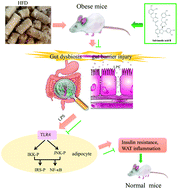Salvianolic acid B prevents body weight gain and regulates gut microbiota and LPS/TLR4 signaling pathway in high-fat diet-induced obese mice
Abstract
Salvianolic acid B (Sal B) exhibits anti-obesity activity, yet the underlying mechanism linking this effect to metabolic endotoxemia remains unexplored. For this purpose, high-fat diet-induced obese mice were orally administered with Sal B for 10 weeks. Hematoxylin/eosin staining, transmission electron microscopy, and immunohistochemical staining were used to evaluate histopathological alterations in the white adipose tissue (WAT) and/or jejunums. The expression levels of genes related to fat and cholesterol synthesis in the WAT were determined by qPCR. The composition of fecal microbiota was profiled by 16S rRNA gene pyrosequencing. Western blotting was employed to evaluate the relative protein expressions involved in lipopolysaccharide (LPS)/toll-like receptor 4 (TLR4) signaling pathway in the WAT. Treatment of obese mice with Sal B improves insulin sensitivity, attenuates body weight gain and alleviates serum levels of LPS and tumor necrosis factor alpha, which is associated with an improvement in intestinal epithelial integrity and probiotic composition as well as a reduction in Gram-negative Proteobacteria and Deferribacteres. In addition, Sal B downregulates the expressions of TLR4 and myeloid differential factor-88, as well as the phosphorylation levels of Jun N-terminal kinase, nuclear factor-kappa B p65, and an insulin receptor substrate in the WAT. In summary, Sal B may attenuate body weight gain and insulin resistance through the regulation of gut microbiota abundances and LPS/TLR4 signaling pathway in obese mice, suggesting Sal B could be a promising drug candidate for protection against obesity.



 Please wait while we load your content...
Please wait while we load your content...